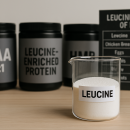The protein supplement market has experienced a significant transformation in recent years.
Protein powders have, for a long time, been aimed at muscle building. It then went mainstream in the 2010s. Ever since, the industry has expanded to include functional protein supplements that target a wide array of health benefits.
These “functional protein powders” are designed to offer more than just protein. They incorporate ingredients to support gut health, immune function, overall wellness, among desirable functions.
However, while functional protein supplements are convenient and appealing, they come with their own set of considerations.
This article delves into the various categories of functional proteins, their benefits, and a critical appraisal of their overall efficacy.
Key Emerging Trends in Protein Supplements
- Gut Health Protein
- Immunity Protein
- Cognitive Enhancement Protein
- Joint Support Protein
- Multi-Functional Sports Protein Shakes
- Weight Management Protein
Gut Health Protein Powders
Gut health proteins are designed to support digestive health by including ingredients such as prebiotics, probiotics, and digestive enzymes.
Gut Health Protein powders aim to maintain a healthy gut bacterial composition (microbiome), support immunity at gut level, improve digestion, and enhance nutrient absorption.
The trend towards gut health proteins aligns with the growing recognition of the gut’s role in overall health.
A healthy gut can influence everything from digestion to immune function and mental well-being.
As consumers become more aware of these connections, demand for products that support gut health alongside protein supplementation is increasing.
Leading Ingredients and Their Benefits:
- Probiotics and Prebiotics: Probiotics like Lactobacillus, Bifidobacterium, and Bacillus strains help balance gut bacteria, while prebiotics like inulin, digestion-resistant maltodextrin from maize and wheat provide food for these beneficial bacteria.
- Digestive Enzymes: Enzymes such as protease, amylase, and lipase aid in breaking down proteins, carbohydrates, and fats, reducing digestive discomfort and improving nutrient absorption.

Gut Health Protein Smoothie from Vega with added prebiotic fibre and probiotics. Disclaimer: Picture for illustrative purposes only. I have no affiliation with Vega.
Immunity Protein Powders
Immunity protein powders are fortified with ingredients known to support the immune system, such as vitamins, minerals, amino acids, and medicinal herbs.
These products aim to boost overall health and resilience, especially during times of stress or illness.
The COVID-19 pandemic has raised awareness of the importance of immune health. This trend has driven demand for products that support immunity, including protein supplements that provide dual benefits of muscle support and immune enhancement.
Ingredients and Benefits:
- Vitamin C and Zinc: These nutrients are critical for immune function and help protect against infections.
- Amino acids like glutamine which serve as fuel for intestinal and immune cells, helping to reinforce immunity.
- Herbs and Botanicals: Echinacea and elderberry are traditionally used to enhance immune function and reduce the severity of colds and flu.

Plant-Based Protein formulated to support immunity from Novalife. Contains herbs that may support immune function. Disclaimer: Picture for illustrative purposes only. I have no affiliation with Novalife.
Cognitive Enhancement Protein Powders
These proteins include nootropic ingredients aimed at improving cognitive function, mental clarity and aiding relaxation. They are designed for individuals looking to boost their brainpower along with their physical performance.
With the rise of the knowledge economy and increasing mental demands, cognitive enhancement products have become popular.
Combining these benefits with protein supplementation appeals to consumers looking for comprehensive health support.
Key Ingredients and Benefits:
- Nootropics: Ingredients like ginkgo biloba, L-theanine, and bacopa monnieri may enhance focus, memory, and cognitive performance.
- Antioxidants: Blueberries, green tea extract, and other antioxidant-rich ingredients support brain health by reducing oxidative stress.
- Minerals, amino acids and adaptogens (e.g. Magnesium, L-Theanine and Ashwagandha) that support relaxation mechanisms in the body.

Protein formulated to support Focus and Relaxation from Foodspring. Disclaimer: Picture for illustrative purposes only. I have no affiliation with Foodspring.
Joint Support Protein Powders
This trend caters to athletes, fitness enthusiasts, and individuals experiencing joint discomfort due to aging or physical activity.
The trend towards joint support proteins is driven by the increasing prevalence of joint-related issues among both the aging population and active individuals.
As people become more proactive about their joint health, the demand for products that offer preventive and therapeutic benefits is growing.
Additionally, the integration of joint-supporting ingredients into protein supplements provides a convenient solution for those looking to address multiple health concerns with a single product.
Joint support proteins are formulated with ingredients that promote joint health, reduce inflammation, and support cartilage repair. These supplements aim to combine the benefits of protein with key nutrients known for their joint-supporting properties.
Key Ingredients and Benefits:
- Collagen: A primary structural protein in cartilage, providing strength and elasticity.
- Glucosamine: Supports the repair and maintenance of cartilage.
- Chondroitin: Helps maintain the integrity of cartilage.
- Turmeric (Curcumin): Known for its anti-inflammatory properties.
- MSM (Methylsulfonylmethane): Reduces inflammation and supports joint health.
My thoughts on Functional Protein Supplements
As the popularity of functional protein supplements continues to rise, it’s essential to critically evaluate their effectiveness, practicality, and overall value.
In this section, I will share my thoughts on these products, drawing from both personal experience and a critical analysis of their ingredients and claims.
We’ll explore the benefits they offer, the potential drawbacks, and whether they truly provide a superior alternative to traditional protein powders or standalone supplements.
By dissecting the current trends and available evidence, my aim is to provide a balanced perspective to help you make informed decisions about incorporating functional proteins into your wellness routine.
Advantages of Functional Protein Supplements
1. Convenience: Functional protein supplements provide the convenience of addressing multiple health goals in a single product. For individuals with busy lifestyles, combining protein with other health-promoting ingredients such as vitamins, minerals, or botanicals simplifies supplementation routines.
2. Synergistic Benefits: These supplements often feature ingredients that work synergistically to enhance overall health outcomes. For example, combining protein with anti-inflammatory compounds like turmeric can support muscle recovery and joint health simultaneously, potentially offering greater benefits than using each supplement individually.
3. Targeted Nutrition: Functional protein supplements are designed to meet specific health needs, making them attractive to consumers with targeted wellness goals. Whether it’s supporting gut health, boosting immunity, or enhancing cognitive function, these products offer tailored solutions.
Disadvantages of Functional Protein Supplements
1. Cost: One of the primary disadvantages of functional protein supplements is their cost. The addition of specialised ingredients often makes these products more expensive than standard protein powders. For budget-conscious consumers, purchasing standalone supplements for specific health benefits might be more economical. The protein can be obtained from food sources in most cases as not everyone needs a protein supplement.
2. Efficacy: The effectiveness of functional protein supplements can vary significantly. The added ingredients may not always be present in sufficient doses to provide meaningful benefits as some may be expensive and alter the taste considerably. Consumers need to scrutinise product labels to ensure the active ingredients are included in effective quantities.
3. Taste and Texture: Incorporating various active ingredients can impact the taste and texture of protein supplements. Ingredients like turmeric, or medicinal mushrooms may alter the flavor profile, potentially making the product less palatable. Not many ingredients are compatible with a protein shake base (e.g. Acidic ingredients like Betaine Hydrochloride or Acetyl-L-Carnitine) and this can limit the number of functional ingredients that can be added to shakes. Manufacturers often add flavorings and sweeteners to mask these changes, which can be undesirable for some consumers.
Conclusion
Functional protein supplements represent a significant advancement in the protein supplement market, catering to a wide range of health and wellness needs. While they offer convenience and the potential for synergistic benefits, they also come with higher costs, possible issues with taste and texture, and potential questions around the efficacy of the added ingredients.
For those with specific health needs, standalone supplements might provide more targeted and effective solutions. Ultimately, the decision to use functional protein supplements should be based on individual preferences, health goals, and budget considerations.

To view my Professional Profile on LinkedIn: please click here
To see my latest product creations: www.bioteenhealth.com
To view my Scientific Publications on PubMed: please click here
To get in touch, please write to: info@supplementscientist.com
Follow supplementscientist.com on Facebook: please click here
Disclaimers
Medical: The information presented on this website is intended for adults 18 or over. Its aim is purely educational and does not constitute medical advice. Please consult a medical or health professional before you begin any program related to exercise, nutrition, or supplementation especially if you have a medical condition. If you consume any product mentioned on our site, you do so on your own free will, and you knowingly and voluntarily accept the risks.
Other: The views expressed in this blog article are solely mine and do not represent the opinions or positions of any company or institution with which I am associated. Any information or opinions provided are based on my personal experiences, research, and understanding. I strive to ensure accuracy and reliability of the information provided.







Leave a Reply